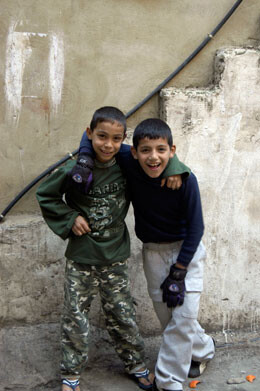Shatila refugee camp, Lebanon 1 January 2008

Young friends in Shatila refugee camp, December 2007. (Christopher Brown)
But none of that was on the minds of my three hosts. We were too busy talking about more important things,
“Inta mitjowez?” (are you married?) asked one of them.
“La” (no) I replied, knowing exactly what the next question would be.
“Lesh?” (why?) my inquisitor pressed.
“Inshallah” (if God wills), I answered and with that the interrogation stopped and a new topic started up. My friend Salah leaned in close to me and said, “Doesn’t matter where you go, you run into a Palestinian and they’re going to ask that question.”
The conversation moved from one topic to the next — sports, relationships, and smoking. All the while I sat and mostly listened but on occasion jumped in to add a comment or two.
I came to Lebanon to record the oral histories of those who remembered being expelled from Palestine in 1948. Hammed — the owner of the shop — had been born in Shatila but had heard about Palestine from his father and mother who both fled when the Zionists, backed by the British, came and forced his family off their land. Now approaching 60 years old, he tells me he wants to see where his folks came from, where he came from, and live out his life.
“Tell me about Palestine,” he asks me wide-eyed, “tell me everything.”
I try to find the right words but for some reason I can’t. It’s too much to explain in one breath. But I tell him about the terraces on hillsides with orchards of grapevines, olive and orange trees while driving alongside route 60 that connects Jerusalem to Hebron, a road designated for Jews only. I mention how beautiful Hebron’s Ibrahimi Mosque looks to me — especially during Ramadan when the mass of people is so large that during Friday prayers, worshipers spill out onto the Old City streets. I say how much I enjoy the olive harvest despite the problems of access to land faced by farmers thanks to the Israeli occupation forces and settlers.
Hammed listens closely, but soon his eyes turn to the television. I look over to see what’s got him so interested when I notice a story, on Al Jazeera, about Jews from all over the Diaspora immigrating to Israel. The four of us look on as images of mini Israeli flags wave at a rapid pace for the new citizens of Israel arriving at Ben Gurion airport in Tel Aviv. Other images show men, women and children weeping, hugging loved ones and kissing the ground as they step off the plane.
“I’ve moved here to support Israel,” exclaims one young woman from New York.
“We have a duty and an obligation to be on the side of Israel,” says another.
A big banner in the background inside the airport spells out “Welcome Home” in both English and Hebrew.
While the story continues, the room gets deftly quiet. All of us stare at the TV, no one makes a sound. Finally, the story concludes and we all look around at each other, smirking and making snide comments, and laughing out loud at the sight of it all. What else can we do at the moment? Then one of the three says, to no one in particular, “What about our return home?”
Christopher Brown is the producer and host of Crossing The Line: Life In Occupied Palestine. He is the son of a Black South African resistance fighter who suffered arrest and torture under the apartheid regime. In 1990 Brown returned to South Africa and was detained and tortured for 500 days by the security police. He lived and worked in Palestine for three years from 2002-2004 in The Old City of Hebron. He is currently on assignment in Lebanon gathering oral histories of Palestinians who fled in 1948. He can be reached at Christo@riseup.net.
Related Links




